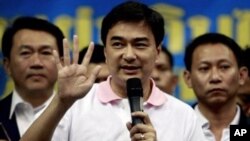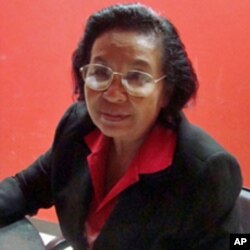Two years after Thai Prime Minister Abhisit Vejjajiva came into office, his government and the opposition are preparing for national elections, which must be held in 14 months. But first, the government wants to heal deep social divisions, to ensure the elections do not lead to more political violence.
Prime Minister Abhisit Vejjajiva stresses the strong economic gains seen in his administration's second year, and its social reform programs.
Thailand's economy grew by nearly 8 percent in 2010, with lower unemployment and higher exports.
In a recent speech wrapping up the year, Mr. Abhisit pointed to programs to aid the poor, including free basic education, help for the elderly and support for farmers.
Government spokesman Panitan Wattanayagorn says an improved economy is part of the government's effort to prepare for elections, which must be held by February 2012.
"Well an election is coming, that's for sure. The prime minister is very clear he is sending a signal for Thai people to be ready. Economic recovery that is very much clear, we have achieved that," Wattanayagorn said. "Second, of course, new election rules should be concluded within a few weeks. The last remaining factor will be how to guarantee a very peaceful, stable election."
Mr. Abhisit heads a coalition government that took office in 2008 after court rulings ousted two governments aligned with Thaksin Shinawatra, a former prime minister. He was ousted in a 2006 military coup. On Monday Mr. Abhisit denied media speculation he may call early elections.
This week ends the most volatile year in Thai politics in almost two decades. Protests led the by United Democratic Front for Democracy pressed the government to step down and call elections. For two months thousands of protesters, known as red shirts, occupied a central part of Bangkok.
In late May the military dispersed the protesters. The crackdown, and the weeks of protests before it, resulted in 92 people dead and up to 2,000 injured, both civilian and military.
About 400 red shirt protesters and leaders were detained, many facing terrorism charges. And the country remains deeply split between the red shirts and protesters known as yellow shirts, who pushed to oust Mr. Thaksin and his successors.
Kudeb Saikrajang, a member of the pro-Thaksin opposition Puea Thai Party, says the party is ready for an election. But he does not expect one soon.
"We don't believe that the election will come before the end of the term because, the coalition parties want the government to be in power for another year," he stated.
Kudeb says his party is unified, and Mr. Thaksin still has considerable influence over its leaders.
One overall concern for the country's political future is whether government commissions investigating this year's bloodshed can rebuild community trust ahead of the vote.
Somchai Homla-or, a human rights lawyer and member of one of the commissions, is confident that reconciliation can be achieved.
"Among the conflicting parties, I believe the majority of them are not the one who wants to use violence and they are friends and they have the same position [of wanting] to strengthen our democracy, they want to see Thailand develop sustainably," he said. "[They] want to see Thailand to be the society of fairness, love, compassion."
Somchai says UDD leaders tell him they stand by their plan to ensure a peaceful election.
But Chris Baker, an author and commentator on Thai politics, is skeptical that the commissions will ease the tensions ahead of the elections.
"People on both sides have already reached their own opinions about what has happened," he said. "Most people have severe doubts that any commission of this sort will produce anything new or convincing. It would be wonderful if it actually did produce something everybody or at least a lot of people could agree on but I think it's highly, highly doubtful."
On January 1, the government will set out a national reconciliation plan to promote equality and justice. But some political analysts and politicians fear it may be too little to heal divisions before Thailand's political parties start to campaign for the right to rule a divided land.





